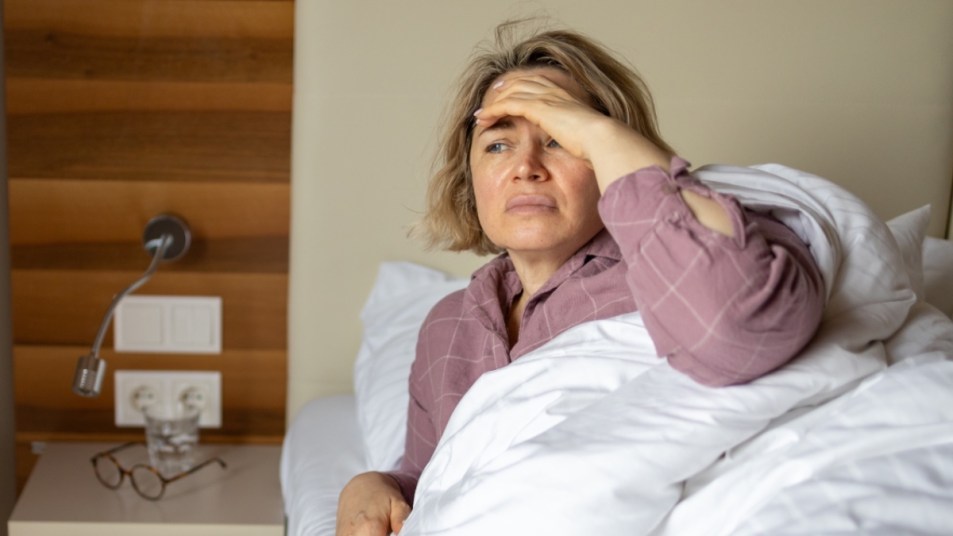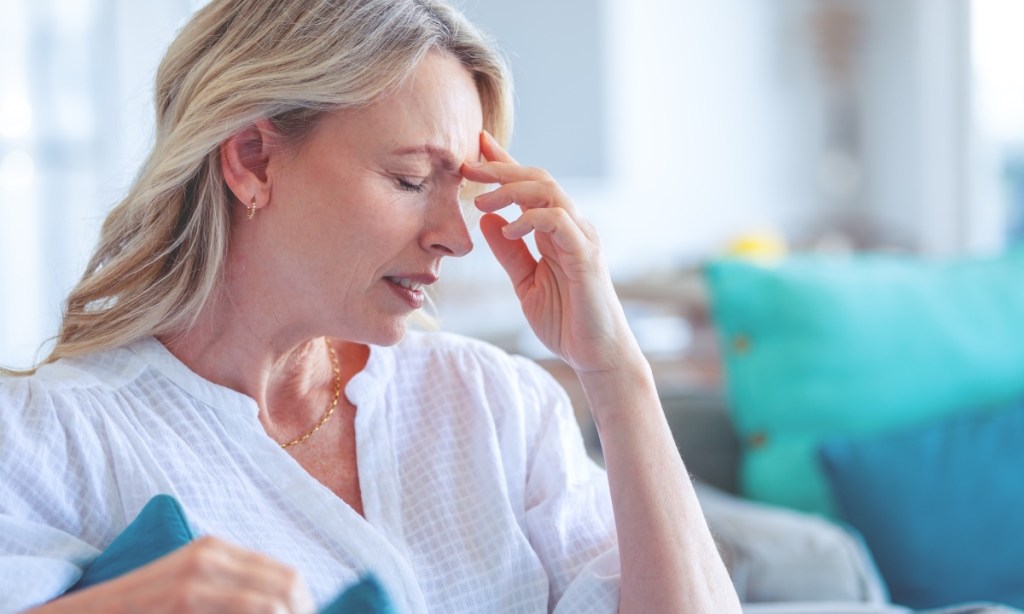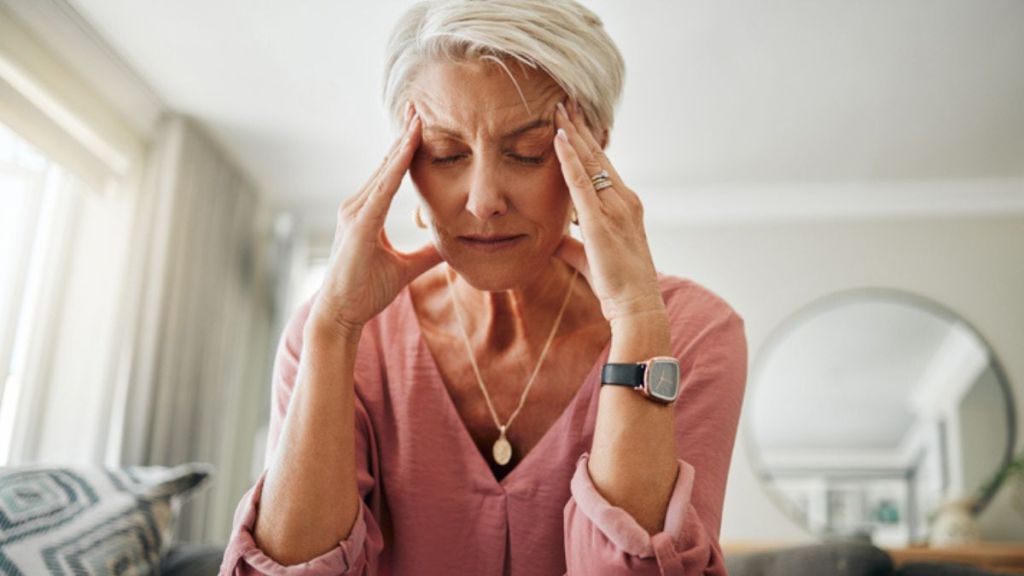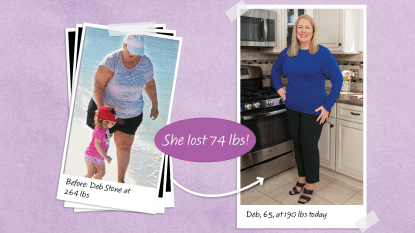Find Yourself Waking up Dizzy? This Is What Doctors Want Women Over 50 To Know
Wooziness is more common with age, and sometimes signals an underlying health issue

You feel it as soon as you open your eyes, and it only worsens when you try stand. You’re unsteady, off balance the room around you seems to be spinning. The unpleasant sensation of waking up dizzy affects more people than you think. But what triggers AM dizziness, and more importantly, how can you get rid of it? It turns out it can be caused by everything from a mild case of dehydration to a more serious underlying health issue. Here’s what you need to know about the most common culprits — and cures — for waking up dizzy.
Waking up dizzy is more common with age
“Dizziness does affect 15 to 20% of the population at some point, and it’s more common for people over 40,” notes Monica Kalra, DO, a physician with Memorial Hermann Health System and a clinical assistant professor at Texas A&M College of Medicine and Baylor College of Medicine.
“When experiencing dizziness, you can also feel disoriented, nauseated and like everything around you is spinning — also known as vertigo — or as though you are about to faint,” adds Casey Kelley, MD, ABoIM, founder and medical director of Case Integrative Health in Chicago, faculty member at Northwestern University’s Feinberg School of Medicine and a board-certified physician in family and integrative medicine. “In fact, dizziness can be accompanied by fainting, especially if caused by a drop in blood pressure.”
As we age, so do our blood vessels, heart and metabolism. Plus our nutrient intake and medications change over time, all of which can play a role in waking up dizzy, Dr. Kelley says. “Due to hormonal influences such as menopause, women are also more likely to experience dizziness,” Dr. Kelley says. “Dizziness can be dangerous because it can cause one to fall. [Or it can] be a sign they are dealing with another health condition.”

Waking up dizzy vs. feeling lightheaded
There’s a difference between waking up dizzy and feeling lightheaded. The latter is a more common occurrence, Dr. Kalra says. “With dizziness, the room is spinning,” she explains. “This is usually due to disorders in the ear and sometimes related to your brain. But if you wake up and feel a little woozy or off balance, that is lightheadedness. [This is] usually caused by dehydration, something heart-related or with your blood pressure, or because you’re anemic.”
Note: Severe dizziness can occur alongside symptoms such as seizures, difficulty breathing, chest pain, vomiting, trouble speaking, hearing or walking, Dr. Kelley says. If you’re experiencing any of these symptoms, seek emergency medical care.
Waking up dizzy: Causes + cures
You know how unpleasant waking up dizzy feels. Here’s how to pin down what might be behind your wooziness, plus the easy ways to dodge trouble.
1. Benign Paroxysmal Positional Vertigo (BPPV)
This is the most common cause of dizziness, Dr. Kalra says. It can be triggered by a sudden change in head movement, and typically affects women more than men. You may experience the sudden sensation of the room spinning. Sometimes, BPPV is accompanied by an upset stomach, vomiting, loss of balance or an unsteady feeling lasting about a minute. The condition occurs when calcium carbonate particles (otoconia) move into the area of the inner ear canal that regulates balance.
How to fix it: Tilting your head in a series of simple moves — known the Epley maneuver — helps roll these calcium crystals back into place, Dr. Kalra says, so you no longer feel dizzy when waking up. It works so well, University of Colorado researchers found that performing the technique just once time stops dizziness completely for up to 91% of folks with vertigo. And the results typically last a year. Check out the video below to give it a try.
2. Dehydration
“It has been reported that a majority of Americans are dehydrated,” Dr. Kelley says. Older adults are particularly vulnerable to dehydration, thanks to everything from reduced kidney function, specific medications, chronic health conditions and reduced thirst sensation. “As we age, our body’s thirst signal decreases,” Dr. Kelley explains “That’s why older adults may be dehydrated and not even realize it.’
How to fix it: Fill a large water bottle each morning and keep it handy throughout the day to ensure you sip at least 8 glasses of H2O daily. “If you’re worried about having to get up to use the bathroom in the middle of the night, avoid drinking water 2 hours before bed,” Dr. Kelley advises. Also smart: Scaling back on caffeine and alcohol, both of which can contribute to dehydration, she adds.

Related: Dehydration Can Be a Sneaky Cause of High Blood Pressure — Here’s How To Replenish Fluids Fast
3. Low blood pressure
Turns out low blood sugar — which can occur from things like missing meals, alcohol consumption or diabetes medications such as insulin — can trigger low blood pressure, leaving you dizzy when you wake. “Low blood pressure can also occur because of orthostatic hypotension, which is when the body struggles to restore your blood pressure after standing up from lying or sitting down,” Dr. Kelley explains.
How to fix it: First, consult your doctor if you’re experiencing low BP on a regular basis, Dr. Kelley says, since she can help you determine the best way to steady your blood sugar. “While you’re waiting to see your doctor, if you are dealing with orthostatic hypotension, make sure you take your time when getting up,” advises Dr. Kelley. “After waking up, stretch a bit before slowly rising to a seated position at the edge of your bed. Then, wait a minute before slowly standing up.”
Know you’re going to be standing for a long period of time? “Make sure you drink plenty of water beforehand,” Dr. Kelley adds .”And if you know you have low blood pressure, adding electrolytes and trace minerals to your water can also be a useful tool to prevent hypotension.”
Note: On the flip side, certain BP-lowering medications can sometimes make you feel dizzy when waking up, too. If that’s the case for you, check with your doctor about adjusting your dosage or possibly switching medications.
4. Sleep apnea
Sleep apnea is when your breathing stops and starts repeatedly overnight. “This causes your blood to not get enough oxygen, leading to a feeling of dizziness or faintness” when you wake, Dr. Kelley says. It’s often accompanied by snoring or waking up fatigued. (See our easy tricks to stop snoring.)
How to fix it: “You should always see a doctor to get a correct diagnosis and treatment plan,” Dr. Kelley notes. “That said, having a motivating reason to get out of bed can lead to better, more restorative sleep. Meditating, journaling and connecting with your community are great places to start to find more purpose in your life.” That’s smart, since a Northwestern University study found folks who had a greater sense of purpose slept more soundly and were 63% less likely to have sleep apnea.

Other lifestyle changes can curb sleep apnea symptoms, too, Dr. Kelley adds. “These include regular exercise, maintaining a healthy weight, using a humidifier to decrease congestion and avoiding smoking and alcohol.”
5. Vestibular migraine
Many migraine sufferers also experience vestibular symptoms, which can include feelings of dizziness, vertigo or imbalance. When a migraine is accompanied by vestibular symptoms, it’s known as a vestibular migraine. And it likely comes as no surprise that this is a common cause of waking up dizzy.
How to fix it: Antihistamines like over-the-counter Benadryl can help with vestibular migraines, Dr. Kalra says. You also may want to speak with your doctor about a preventative medication to reduce the frequency of migraine attacks. Why? A St. Louis University School of Medicine study found preventative meds and lifestyle changes (like stopping caffeine intake) eased vestibular migraines for 75% of sufferers.

Related: Migraine vs Tension Headache: How to Tell the Difference + the Best Way to Speed Relief
6. Vestibular neuritis
Vestibular neuritis “sounds rare, but it’s the third leading cause of vertigo in the US,” Dr. Kalra says. “It’s caused by viruses like the flu, COVID or herpes simplex virus type 1.” The inner ear disorder causes symptoms such as sudden, severe vertigo, dizziness, balance problems, nausea and vomiting. It can last anywhere from a few hours to a few days.
How to fix it: “Physicians usually prescribe a three-week taper of oral steroids to treat vestibular neuritis,” Dr. Kalra says. “Although vestibular neuritis can’t cause a stroke, sometimes the symptoms of vestibular neuritis can be similar to a cerebellar stroke. This is why it’s important to see a physician quickly to differentiate between the two conditions.”
7. Ménière’s disease
This balance disorder is caused by an abnormality in a part of the inner ear. Fluid build-up here can cause a severe spinning sensation and affect hearing. It’s more common in people in their 40s and 50s, and symptoms can include dizziness, high frequency hearing loss, ringing in the ears and a feeling of fullness in your ear (typically just one ear).
How to fix it: Your doctor may prescribe diuretics and salt restriction, certain medications and possibly a hearing aid. “Low salt consumption is important to treat Ménière’s disease,” Dr. Kalra notes. “The recommended salt intake for patients with Ménière’s disease is 2 grams per day. Salt substitutes can be used as long as they don’t contain MSG, [which] can further exacerbate Ménière’s disease.”
For more ways to ease dizziness and bolster your balance:
The Cold Water Tip That Dials Down The Dizziness That Comes With Migraines By 93%
Try This 90-Second Squat Challenge + How the Results Can Boost Your Posture and Balance
Fitness Expert: These Are the Best Ab Workouts for Women Over 50 to Improve Balance
This content is not a substitute for professional medical advice or diagnosis. Always consult your physician before pursuing any treatment plan.












